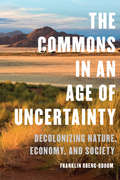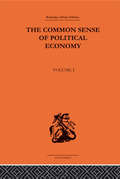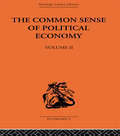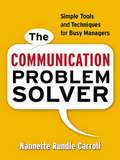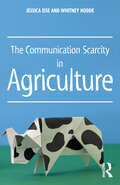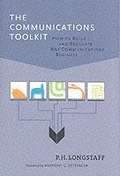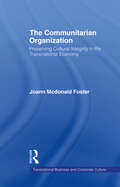- Table View
- List View
The Commons in an Age of Uncertainty: Decolonizing Nature, Economy, and Society
by Franklin Obeng-OdoomIn the last two hundred years, the earth has increasingly become the private property of a few classes, races, transnational corporations, and nations. Repeated claims about the "tragedy of the commons" and the "crisis of capitalism" have done little to explain this concentration of land, encourage solution-building to solve resource depletion, or address our current socio-ecological crisis. The Commons in an Age of Uncertainty presents a new explanation, vision, and action plan based on the idea of commoning the land. The book argues that by commoning the land, rather than privatising it, we can develop the foundation for prosperity without destructive growth and address both local and global challenges. Making the land the most fundamental priority of all commons does not only give hope, it also opens the doors to a new world in which economy, environment, and society are decolonised and liberated.
The Commons: Drivers of Change and Opportunities for Africa (Africa Development Forum)
by Benjamin Coriat Stéphanie Leyronas Kako Nubukpo'The Commons' explores the many forms of development being championed by Africa's residents, users, and citizens. In addition to managing property and shared tangible and intangible resources collectively, communities are experimenting with a concept of 'commoning' founded on values such as community, engagement, reciprocity, and trust. In practice, their approach takes the form of land-based commons, housing cooperatives, hybrid cultural spaces or places for innovation, and collaborative digital platforms. The purpose of this book, where observation of historical and recent practices converges with new theories within commons scholarship, is not to promote commons themselves. Rather, it examines the tensions, drivers of change, and opportunities that surround commons dynamics in Africa. This book highlights the abundance of commons-based entrepreneurial processes in Sub-Saharan Africa and shows that partnerships between African public authorities and communities involved in the commons can be powerful drivers of sustainable development for the continent.
The Commonsense of Political Economy: Volume One (Routledge Library Editions)
by Philip H. WicksteedFirst Published in 2003. Routledge is an imprint of Taylor & Francis, an informa company.
The Commonsense of Political Economy: Volume Two (Routledge Library Editions)
by Philip H. WicksteedThis is Volume XXI of twenty-three in a collection on the History of Economic Thought. Originally published in 1933, this volume offers selected papers and reviews on economic theory as a second volume of two.
The Communicating Scientist: A Practical Handbook
by Joanna Bagniewska Olle Bergman Sarang ParkAre you a researcher, science professional, or student looking to communicate more clearly and effectively in academia and beyond? The Communicating Scientist has got you covered! This essential guide consists of three easy-to-navigate sections: 1. Theoretical Framework: Plant your feet into a robust foundation that draws on areas from ancient rhetoric to modern psychology, while incorporating insights from marketing, social media, and journalism. This section equips you with the "why" behind effective communication. 2. Core Skills and Techniques: Build a central toolkit for communication activities of science and tech professionals, along with practical tips and suggestions. 3. A Practical Recipe Book: Get step-by-step instructions and hands-on tips from experts for 24 specific communication scenarios, as diverse as writing a grant proposal, developing an elevator pitch, doing a media interview, or curating an online presence. This handbook isn't just another academic communication guide. The Communicating Scientist draws on the knowledge, experience, and tricks of the trade from professional communicators, while remaining strongly rooted in a scientific context. It will help you with scientific peer-to-peer communication, disseminating research to the general public, and collaborating with external partners. Written in a conversational and approachable style, The Communicating Scientist is accessible and appropriate for Communicating Scientists at all stages of their professional journey.
The Communication Book: 44 Ideas For Better Conversations Every Day
by Roman Tschäppeler Mikael KrogerusMikael Krogerus and Roman Tschäppeler have tested the 44 most important communication theories and distilled them in book form, alongside clear and entertaining illustrations. Want better conversations? Ask open-ended questions that have no right or wrong answers—make your partner feel brilliant. Want better meetings? Ban smartphones, use a timer, and make everyone stand up. Want better business deals? Focus on the thing, rather than the person; on similarities, rather than differences; and on good outcomes, rather than perfect ones. Whether you want to present ideas more clearly, improve your small talk, or master the art of introspection, The Communication Book delivers, fusing theoretical knowledge and practical advice in a small but mighty package. With sections on work, the self, relationships and language, this book is indispensable for anyone who wants to improve what they say, and how they say it.
The Communication Code: Unlocking Every Relationship, One Conversation at a Time
by Jeremie Kubicek Steve CockramProvides a proven series of skills and techniques that anyone can use to make their relationships thrive Healthy communication is essential in any professional or personal relationship. When the lines of communication are frayed or broken, the resulting drama, unnecessary conflict, and inefficiency often lead to 'dropping the ball'. Better communication yields better results. It's a no-brainer—honest conversations build deeper, more productive relationships. It may seem simple in theory, but healthy communication is one of the most challenging things to master in practice. The Communication Code helps you set up conversations and communication in a way that creates a win-win scenario for everyone involved. In this real-world guide, bestselling authors and international speakers Jeremie Kubicek and Steve Cockram share their simple but powerful strategies for boosting your emotional intelligence and elevating your interpersonal communication skills. Step by step, you will learn to integrate Care, Celebration, Collaboration, Critique, and Clarification into your communication toolbox. Using one of these 5 Cs, you can verbally ask someone to respond in the way that you most want, and as a result, facilitate a successful interaction. Written by the team that brought you The 100X Leader, The 5 Voices, and The 5 Gears, this must-have book will help you: Connect and communicate effectively with your team, your family, and your friends Define the parameters of a conversation from the outset to avoid any misunderstandings Understand the power dynamics of an interaction to eliminate the fear of honest conversation Offer constructive criticism without offending or disappointing the person on the other side Maximize your situational awareness and collaborate like a pro Prevent communication attacks and restore healthy communication flow The Communication Code: Unlock Every Relationship, One Conversation at a Time offers a practical, easy-to-implement solution for decreasing or eliminating miscommunication. It is essential reading for anyone wanting to improve the health of their relationships through clear and authentic communication.
The Communication Problem Solver: Simple Tools and Techniques for Busy Managers
by Nannette Rundle CarrollMore business problems center on issues of communication than is commonly believed. Frequently, managers deal with outward manifestations of problems while the real underlying communication issues remain unchanged. This book offers practical guidance, complete with real-world examples, for managers who want to address root causes of problems. How to form better relationships, how to provide more effective input and feedback, how to use communications skills to be a better leader, and how to create a better work environment are all covered in this book. Annotation c2010 Book News, Inc. , Portland, OR (booknews. com)
The Communication Scarcity in Agriculture
by Jessica Eise Whitney HoddeToday, the general public craves information on food and agriculture with an unprecedented passion. But the agricultural sector, unaccustomed to an interested and inquisitive society, has largely failed to respond to the public’s demands for information. Instead, corporations, time-pressed journalists, bloggers, media celebrities, film-makers, authors and concerned consumers jumped in to fill the void. Food is emotional, and these players - some well-intentioned and others not - got a lot of traction playing off consumer fears of the unknown. This critical and timely book explains how changing demographics, cultural shifts, technological advances and agriculture’s silence all combined to create the perfect storm – a great chasm between those who know, and those who don’t know, agriculture. The ramifications of a poorly-informed consumer base are now becoming clear in our policy debates and consumer-driven business decisions. There is a lot of common ground between the agricultural sector and their consumer base, but each group largely fails to appreciate it, and the consequences of such a divide grow increasingly dire. Drawing on a wide-range of expertise, from leading agricultural researchers to major agribusiness leaders to consumer advocates, Eise and Hodde lay out exactly why communication is so urgently critical to our modern-day agricultural system. They outline the major themes affecting agricultural communication – perception, emotion, technology, science - and what we can do now to improve the debate and safeguard our future food supply for generations to come.This book is suitable for those who study agriculture, environmental economics and mass media and communication.
The Communications Consultant’s Foundation: Leveraging Public Relations Expertise for Personal and Client Success
by Roger DarnellFor all professionals and students who want to improve their prospects in business, this book prepares and positions them to build dream careers, giving them the education and guidance required to develop vital soft skills, and work remotely and independently. After establishing a foundation for solid professional communications on a personal level, it quickly opens doors to business insights and opportunities that are exciting, inspiring, and highly sustainable. Immersing readers into the key realms of business success and exploring the full spectrum of essential communications practices, they gain knowledge and trade skills of immense value, including: • The basics of positive, proactive, strategic communications for individuals and organizations • What it means to be a PR expert in the creative industry and to do great work • An introduction to essential business imperatives, with high-level instruction on creativity, strategy, leadership, management, marketing, and much more • Customer service and all it entails • Extensive exploration of the PR toolset and its application in real-world marketing scenarios This book brings home all instruction with sophisticated questions and challenges, ensuring readers have every opportunity to comprehend and grow, step by step.
The Communications Consultant’s Master Plan: Leveraging Public Relations Expertise for Client and Personal Success
by Roger DarnellThis volume builds on Roger Darnell’s The Communications Consultant’s Foundation by providing insider knowledge gained over the past three decades atop the field of communications consulting, incorporating lessons learned serving businesses in the global creative industry. Going beyond the basics of a communications consulting business, this book parses and distills the knowledge of top business management luminaries, helping readers build and expand their expertise to heighten their opportunities, and maximize all aspects and phases of their businesses, from start-up through to succession. It discusses essential topics including: • The business of running a PR agency, with emphasis on landing clients and honing expertise to remain exceptional • Advanced PR practices including investor relations and strategic planning • Agency expansion, addressing growth and exit strategies Working PR professionals, entrepreneurs, students, and recent graduates will appreciate high-level insights from a seasoned business owner, as well as templates for proposals, campaign planning, and more. Read with The Communications Consultant’s Foundation or on its own, this book will lead readers on life-changing journeys and help a new generation of smart communicators take their professional pursuits to the highest levels.
The Communications Industries in the Era of Convergence (Routledge Studies In Global Competition Ser. #54)
by Catherine E. MulliganThis book provides a unique view of the evolution of these industries, drawing out how technology and economic forces have worked together to create platforms around which different companies interact. Through identifying the key aspects of this evolution over the past decades, the author is able to put forward a unique view of the emerging industrial structure of the communications industries – the formation of an Information-Driven Global Commodity Chain, one that holds both incredible promise and challenges for our world.
The Communications Toolkit: How to Build and Regulate Any Communications Business
by P. H. Longstaff Anthony OettingerThis book provides the tools necessary to build lasting, flexible strategies to survive and grow in these times of transition. Whether you are a business executive, lawmaker, policy analyst, industrialist, stock analyst, lawyer, or judge, these tools will help you to solve real problems right away.
The Communicative Architecture of Policing: Community, Power and Legitimacy in the Age of ‘New Media’ (Routledge Studies in Policing and Society)
by Cian Ó ConcubhairThe Communicative Architecture of Policing is a ground-breaking study of police communications and police–media relations in the social media era. It is based on nearly a decade of research on police–media relations, including two years of extended observational study in local newsrooms and police communications departments, and dozens of interviews with police communicators, chief police officers and journalists. This book is the first to undertake a deep ethnography of both police communications and local news media in a single policing area. It also provides an innovative theoretical reappraisal of the mechanics of police–media power relations, grounded in ideas of legitimacy, mass communications and local governing power. The book describes the lived experiences of journalists through the collapse of the local news media in England: declines wrought in large part by the advent of social media. It also describes a crisis of confidence in local journalism and its perceived institutional status in the local community. By contrast, the book charts the emergence of an empowered, professional police communicator class in policing––and its distinctive cultural features––rooted in the mass communications potential of social media. The book weaves together these empirical insights by developing novel approaches to police legitimacy theory and institutional power relations. This book will be of interest to students, scholars and practitioners in the fields of criminology, media studies, communication studies, journalism and policing.
The Communicative Engineer: How to Ask, Listen, Write, Speak, and Use Visuals
by Stuart G. WaleshTHE COMMUNICATIVE ENGINEER Application-oriented communication guidebook designed for engineering students and practitioners to improve their asking, listening, writing, speaking, and use of visuals Practicing engineers spend about half their time communicating ideas, facts, and feelings but invest only a small part of their formal education learning how to communicate. The Communicative Engineer addresses this gap. When used as a textbook for students or resource for practitioners, this book shows engineers in all disciplines how to use five communication modes—asking, listening, writing, speaking, and visuals—to participate in or lead successful engineering projects and achieve professional success and significance. Written by a highly qualified author with six decades of relevant experience, The Communicative Engineer: Illustrates, using examples, the benefits of communication knowledge, skills, and attitudes (KSA) and the costs of poor communicationPresents communication fundamentals and goes well beyond theory by illustrating numerous applicationsDescribes the five modes of communication, including their pros and cons, and offers detailed advice on when and how to use themPrepares readers to use or participate in various communication forms such as interviews, letters, meeting minutes, memoranda, oral examinations, proposals, question and answer sessions, reports, resumes, speeches, and texts Profiles excellent engineer communicators to serve as exemplars and references memorable speeches from within and outside of engineering to provide examplesProvides thorough documentation of content for readers who want to dig deeper into selective aspects of communication Supplementing the scientific and technical education of engineers, The Communicative Engineer offers engineering students and practitioners in all disciplines the parallel communication KSA needed to fully realize their potential. Given technology’s ever-increasing role in society, the communicative engineer will be prepared to fill leadership roles.
The Communist Economic Challenge (Routledge Library Editions: Soviet Economics #2)
by David IngramThe Communist Economic Challenge (1965) examines the substantial industrial development in the Soviet Union, and its European satellites, and China, looking at Khrushchev’s boast that by 1970 the USSR’s industrial output would surpass that of the USA. The book analyses the communist record, and evaluates the reality of the Soviet claims that its growth was a mark of the ‘inherent superiority’ of its economic system over capitalism.
The Communist Judicial System in China, 1927-1976: Building on Fear (China: From Revolution to Reform)
by Qiang FangDrawing on hundreds of newly released judicial archives and court cases, this book analyzes the communist judicial system in China from its founding period to the death of Mao Zedong. It argues that the communist judicial system was built when the CCP was engaged in a life-or-death struggle with the GMD, meaning that the overriding aim of the judicial system was, from the outset, to safeguard the Party against both internal and external adversaries. This fundamental insecurity and perennial fear of loss of power obsessed the Party throughout the era of Mao and beyond, prompting it to launch numerous political campaigns, which forced communist judicial cadres to choose between upholding basic legal norms and maintaining Party order. In doing all of this, The Communist Judicial System in China, 1927-1976: Building on Fear fills a major lacuna in our understanding of communist-era China.
The Communist Manifesto
by Friedrich Engels Karl MarxThe Communist Manifesto presents the argument that capitalism is by its very nature exploitative and hence is antithetical to freedom. Written in 1848, it became the blueprint for the communist wave that would sweep Europe. It remains a fascinating read.
The Communist Manifesto: The Authorized English Translation, Edited and Annotated by Friedrich Engels
by Friedrich Engels Karl MarxOne of the world's most influential political treatises, The Communist Manifesto outlines the base principles of communism as they relate to class struggle, economics, and politics.Originally published in 1848 as the Manifesto of the Communist Party, The Communist Manifesto was foundational to the development of modern communism and socialism.
The Communist Manifesto: The Political Classic (Capstone Classics)
by Friedrich Engels Karl MarxDISCOVER THE WORK THAT LAUNCHED REVOLUTIONS AROUND THE WORLD Although it was published in 1848, The Communist Manifesto is as controversial and provocative as ever. Its stirring and poetic language helped spread Marx and Engels' socialist message far and wide, unleashing a century of political revolution. In an age of great inequality, the Manifesto's message of an exploited and suffering working class that must rise up and claim the means of production and wealth continues to resonate. This deluxe edition features an insightful introduction from Tom Butler-Bowdon which explains how the text came to be written, and why it remains popular.
The Communitarian Organization: Preserving Cultural Integrity in the Transnational Economy (Transnational Business and Corporate Culture)
by JoAnn M. FosterFirst Published in 1999. Routledge is an imprint of Taylor & Francis, an informa company.
The Community College Career Track: How to Achieve the American Dream without a Mountain of Debt
by Thomas SnyderGet a good education without massive debt, and enter a field that's actually hiringIn coming years, millions of great jobs will be opening up in growth areas like advanced manufacturing, biotechnology, health care, information technology, and sustainable energy. These jobs can pay as well as, or much better than, the average income for four-year college graduates. They generally offer high levels of day-to-day satisfaction. And the path to all of them begins in the community colleges. In The Community College Career Track, Tom Snyder gives young people and their parents, as well as mid-life career changers, a practical, inspiring guide to taking that path and completing it successfully.The old model of a bachelor's degree leading to a good job and career has broken down for large numbers of young people, many of whom graduate college only to work in a career that doesn't require a degree. Meanwhile, millions of productive American white collar and blue-collar workers have been laid off and need retraining for second careers. This book helps you find a new way forward.Offers insights on how to save money over a lifetime through an affordable college education that provides high-paying jobsAuthor Tom Snyder is the president of Ivy Tech Community College, Indiana's statewide community college system and the largest singly accredited community college system in the countryAuthor Tom Snyder has confronted the education-jobs mismatch from both sides, first as a highly successful business executive and now as an award-winning educator. Follow his efficient, affordable, and rewarding path to a great career and a satisfying life.
The Community Economic Development Movement: Law, Business, and the New Social Policy
by William H. SimonWhile traditional welfare efforts have waned, a new style of social policy implementation has emerged dramatically in recent decades. The new style is reflected in a panoply of Community Economic Development (ced) initiatives--efforts led by locally-based organizations to develop housing, jobs, and business opportunities in low-income neighborhoods. In this book William H. Simon provides the first comprehensive examination of the evolution of Community Economic Development, complete with an analysis of its operating premises and strategies. He describes the profusion of new institutional forms that have arisen from the movement, amalgamations that cut across conventional distinctions--such as those between private and public--and that encompass the efforts of nonprofits, cooperatives, churches, business corporations, and public agencies. Combining local political mobilization with entrepreneurial initiative and electoral accountability with market competition, this phenomenon has catalyzed new forms of property rights designed to motivate investment and civic participation while curbing the dangers of speculation and middle-class flight. With its examination of many localities and its appraisal of the strengths and weaknesses of the prevailing approach to Community Economic Development, this book will be a valuable resource for local housing, job, and business development officials; community activists; and students of law, business, and social policy.
The Community Manager's Playbook
by Lauren PerkinsSavvy companies recognize the value of a strong community. Think of Nike and its community of runners, Nike+, and you'll quickly understand that creating and fostering an online community around a product or brand is a powerful way to boost marketing efforts, gain valuable insight into consumers, increase revenue, improve consumer loyalty, and enhance customer service efforts. Companies now have the unprecedented opportunity to integrate their brand's messaging into the everyday lives of their target audiences. But while supporting the growth of online communities should be at the top of every company's priority list, all too often it falls by the wayside. That's why brand strategy expert and digital marketer Lauren Perkins wrote The Community Manager's Playbook (#CMplaybook on Twitter), a must-read guide for business and brand builders who need to strengthen their approach to online B2C community management and customer engagement. As Perkins explains, if companies want to create thriving online communities focused on their product or brand, they must do more than simply issue a few tweets a day, create (and then abandon) a Facebook page, and blog every once in a while. Instead, organizations of all sizes must treat community management as a central component of their overall marketing strategy. When they do, they will be rewarded handsomely with greater brand awareness, increased customer use and retention, lower acquisition costs, and a tribe of consumers who can't wait to purchase their next product. Perkins not only teaches readers how to build an engaging community strategy from the ground up, but she also provides them with the tactical community management activities they need to acquire and retain customers, create compelling content, and track their results along the way. Distinctive in its comprehensive, step-by-step approach to creating online communities that are fully consistent with a company's existing brand voice, The Community Manager's Playbook: Explains how excellent community management provides a competitive advantage with a large impact on salesProvides an in-depth overview of brand and business alignmentTeaches readers how to identify their community's online target audience and influence their needs and wantsDetails the appropriate online channels through which content should be distributedChampions the use of an agile approach through repeated testing to maximize the return on every company investmentDiscusses the many diverse metrics that can be used to measure community scopeToday, there is no brand strategy without a community strategy. Companies that are not developing communities are losing control of their brands and missing opportunities to optimize their marketing investments. With The Community Manager's Playbook as their guide, however, marketing professionals and the companies and brands they represent will be equipped with the tools they need to manage their online marketing efforts, engage their core customers at every level, leverage community insights into the product development cycle, and ensure that their messaging is heard across all corners of the digital landscape.
The Community of Oil Exporting Countries: A Study in Governmental Co-operation (Routledge Library Editions: The Oil Industry #3)
by Zuhayr MikdashiThe Community of Oil Exporting Countries (1972) looks at the oil producing countries of the developing world and their economic reliance on oil. This reliance comes with an unwillingness to leave their economic fate to the vagaries of competition, leading to co-operative schemes that protect them from trade receipt fluctuations. This book is a close reading of the situation, and the resulting co-operative efforts.
